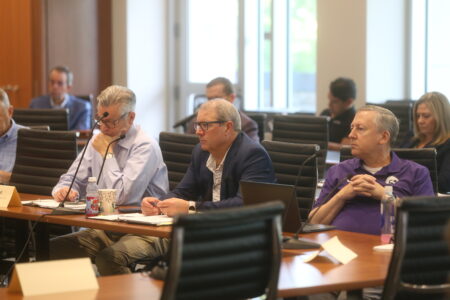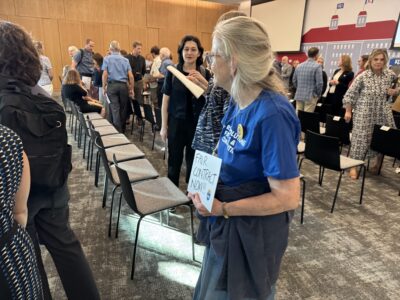
Girod says KU, higher education need to better understand details of proposed compact with federal government

photo by: Chad Lawhorn/Journal-World
University of Kansas Chancellor Douglas Girod, center, is pictured with Wichita State President Richard Muma, left, and K-State President Richard Linton, right, on July 30, 2025 at the Kansas Board of Regents' annual retreat.
Universities across the country are trying to figure out what to make of a proposed “compact” between the federal government and research universities that rely heavily on federal grants.
Is the federal document a true compact or more of an “offer you can’t refuse?”
University of Kansas Chancellor Douglas Girod likely will get the chance to be involved in that debate as much as he wants. Girod currently is the vice chair of the prestigious Association of American Universities, which is considered the premier group of research universities in North America. More importantly, he’s set to become the chair of the group in a matter of days.
That will likely get him an invite to many a meeting, and The Wall Street Journal reported, and KU has confirmed, that Girod last week was part of an Oct. 17 compact meeting with top officials in the U.S. Department of Education.
I don’t know what Girod said in that meeting, but I can tell you what he was saying about the idea of the compact the day before that meeting because I interviewed him about the topic during a break in a Kansas Board of Regents tour that was taking place at KU on Oct. 16.
Unlike some other higher education leaders, Girod didn’t dismiss the compact idea. The American Association of Colleges and Universities last week released a statement calling the proposed compact an “ultimatum,” and akin to an “executive fiat” that puts universities in a position of trading academic freedom for federal funding.
Universities that agree to the compact would need to ensure that they would abolish governance structures or units that “purposefully punish, belittle and even spark violence against conservative ideas.” The compact also calls for a cap on international, undergraduate enrollment, and also addresses policies related to tuition, the use of standardized tests and other such issues. There’s also language in the compact that suggests universities that sign the compact will have favorable status for federal grants.
Girod said he is still in the mode of trying to comprehend the full text and spirit of the nine-page document.
“I will say just in the compact specifically, a big chunk of that compact says you have to follow the law, which obviously we do and we have no issues with,” Girod told the Journal-World. “It is trying to understand the subtleties of what does it mean to have favorable status? What does it mean to not to have it?
“You don’t have great answers to any of those yet. My philosophy is we need to engage in that conversation, try to understand it and help both sides educate each other and see if we can get to something that meets what they need, but continues that relationship between the federal government and higher education in this country.”
At that point, I asked Girod whether he was feeling confident that relationship could continue in a way that maintains enough independence for universities to do the work of innovation and disseminating knowledge.
“I certainly hope so,” Girod said. “I mean, again, it is just the uncertainty of it all, which is what is challenging for everyone. It creates a lot of uncertainty, and uncertainty always creates angst. I don’t care what industry you are in, or where you are in society — uncertainty creates angst.”
In this case it is high stakes angst. Like several other higher education leaders, Girod is being clear that universities — particularly research universities — would struggle to survive if the federal government chose to break off relations with universities.
“None of us can survive without our partnership with the federal government because we are just too entwined at this moment in time,” Girod said. “And it is true for financial aid for our students and support programs for our students and through the research funding that helps drive our research labs and innovation.
“You pull any one of those legs of the stool out, we become a nonviable enterprise pretty quickly.”
Of the nine universities that the White House originally delivered the proposed compact to for consideration, seven of them have publicly rejected it — the Massachusetts Institute of Technology, Brown University, the University of Pennsylvania, the University of Southern California, the University of Virginia, Dartmouth College and the University of Arizona.
The University of Texas at Austin, and Vanderbilt have not announced a position, according to a published report.
As for whether other schools, like KU, could join the compact, President Donald Trump said earlier this month via a social media post that all colleges in the country could now sign onto the compact, if they so choose.
In terms of the Oct. 17 meeting that Girod attended with U.S. Department of Education officials, Girod has not made a specific statement about what he said in the meeting. However, U.S. Education Secretary Linda McMahon said via social media that the meeting with the group of presidents and chancellors was a “positive and wide-ranging conversation.”







